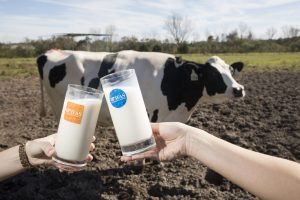
January 11th, National Milk Day: A time to honor the dairy industry and the essential role milk plays in our diets. As we raise a glass to commemorate this day, it’s also an opportune moment to delve into the world of milk alternatives. Join me on a journey that explores the differences between traditional cow’s milk and the growing popularity of plant-based alternatives.
National Milk Day commemorates the day when milk deliveries in glass bottles began in the United States in 1878. Dairy has long been a staple in many households, providing essential nutrients like calcium and vitamin D. From creamy whole milk to the leaner options like skim and 2%, traditional cow’s milk has been a dietary cornerstone for generations. The dairy industry is not just a source of high-quality products but a testament to the dedication, innovation, and resilience of its farmers. So, whether you enjoy a cold glass of milk, a slice of cheese, or a spoonful of yogurt, savor the flavors of dairy heritage, and appreciate the journey from farm to table.
In recent years, there has been a significant rise in the popularity of plant-based milk alternatives. Whether due to lactose intolerance, ethical concerns, or environmental considerations, many individuals are exploring options like almond, soy, oat, rice and coconut milk. These alternatives offer a diverse range of flavors and textures, catering to various dietary preferences. While cow’s milk is a rich source of calcium, vitamin D, and protein, it is not suitable for those with allergies or lactose intolerance. For instance, soy milk is highest in protein amongst plant-based alternatives and low in saturated fat while coconut milk has zero protein. Almond milk is known for having less calories but higher in sodium. This chart makes a great comparison on the nutritional composition of cow’s milk and plant-based beverages. Plant-Based Beverages vs Cow’s Milk

The taste and texture of milk alternatives can significantly vary, influencing personal preferences. While some may prefer the nutty undertones of almond milk, others might enjoy the creaminess of oat milk. Experimenting with different plant-based options allows individuals to find the one that suits their taste buds and culinary needs.
As we celebrate National Milk Day, it’s essential to recognize and appreciate the diversity in our choices when it comes to milk. Whether you’re a big supporter of traditional cow’s milk or an advocate for plant-based alternatives, the key is understanding the nutritional nuances and making informed choices that align with your values and lifestyle. Today is also an opportunity to appreciate the hard work and dedication of all our farmers.
So, here’s to a day of raising our glasses in celebration of the rich and evolving world of milk!
If you are interested in learning more about the dairy industry a good source of information for both Florida and National agencies and organizations is Florida Dairy Extension which was my primary source for this article, and I utilized chatGPT.
Note: All images and contents are the property of UF/IFAS.



